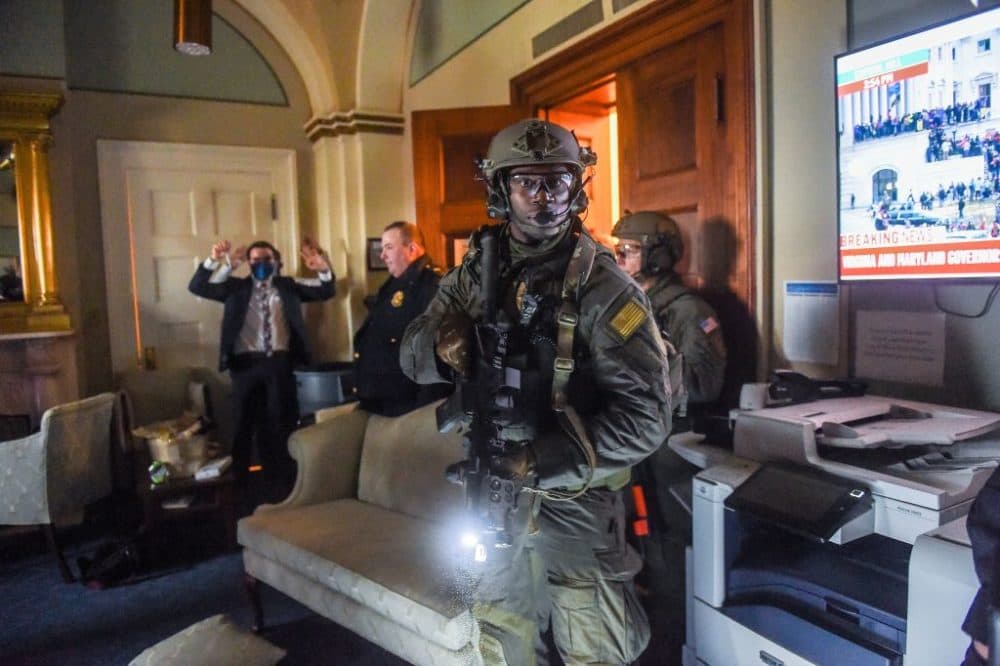Advertisement
Commentary
What the Jan. 6 hearings are really about

On Thursday night, the House Jan. 6 committee will finally have a chance to present its findings to the American people. Committee members hope to deliver a riveting drama worthy of its prime-time slot, one replete with eyewitness testimony, surveillance video and never-seen-before photos from the White House. The goal will be to remind Americans just how close we came to losing our democracy.
We all know the climax of that story: on the day that should have been devoted to the peaceful transfer of power, President Trump incited a mob to storm the Capitol. He then watched, in obvious glee, as his “very lovely people” assaulted police, terrorized lawmakers and threatened to hang his vice president.
Five people died as a result of the riot, and hundreds were injured, many of them Capitol police.
The shock of the insurrection was enough to jolt some Republicans into condemning their dear leader, at least for a few days. But over the past 18 months, they have reverted to a familiar posture of boot-licking, fearing Trump’s cult-like control of the GOP base.
The committee would be wise to tell the story of Trump’s failed coup from the beginning, and to use the hearings to fight the ongoing efforts to disenfranchise voters and destabilize our future elections, which amounts to a second, more dangerous coup.

It should not be complicated. Here are the salient facts:
In early November 2020, America elected Joe Biden to the office of president. He defeated the incumbent, Trump, by more than 7 million votes and 74 electoral votes. Trump was a historically unpopular president who left office with an approval rating of 34%, in part because of his disastrous response to the COVID pandemic, which sent the U.S. economy into a tailspin.
Trump refused to accept his loss and did everything in his power undo it. He filed 62 lawsuits, many alleging voter fraud. They failed. He demanded recounts and audits, none of which changed the results. He attempted to intimidate various state officials into overturning their voting results. He tried to oust then-Attorney General Bill Barr, in favor of someone even more loyal, who would think nothing of using the Department of Justice to do his bidding.
In sum: because Trump could not accept that he lost the 2020 election, and after exercising all other options, he fomented a violent and treasonous attack on the Capitol.
Advertisement
The central goal of the hearings shouldn’t be limited to telling this story. It should be to step back and help your average voter recognize how fragile our democracy has become.
The central goal of the hearings shouldn’t be limited to telling this story. It should be to step back and help your average voter recognize how fragile our democracy has become. This can be hard to do in a country where people tend to take our national stability for granted.
In fact, Republicans have worked for decades to erode Americans’ trust in our government. Since the days of Ronald Reagan, the conservative strategy has been to break the government, then to run against it. During the Trump years, the GOP became far more radicalized. They now openly oppose democracy itself.
This is why the majority of Republicans now believe — or say they believe— that Trump won an election he actually lost. They applaud his efforts to overturn the loss, and those of his supporters who beat police officers with metal poles.
The Jan. 6 committee needs to emphasize the grave danger that persists in the widespread effort on the political right to undermine elections.
Republicans are doing this by making it more difficult to vote and more difficult (and less reliable) to count votes. They have sought to install election officials who value party over country, and waged a flagrant campaign to intimidate election officials.
If our political leaders identified any of these behaviors in a foreign country, they would rightly identify the perpetrators as would-be authoritarians. Here in America, this has become normalized behavior among members of the Republican Party.
The sacred opportunity presented by these public hearings is not just to document the last coup, but to head off the next one, by inspiring Democrats in the Senate to remove the filibuster and (at long last) vote the For the People Act into law.
The measure, passed by the U.S. House last March, would expand voting rights, crack down on corruption in our campaign finance system and strengthen ethics laws for members of Congress. All three of these goals are supported by the vast majority of Americans. They are, quite literally, the democratic will of the people.
The only reason the bill hasn’t passed is because Republicans have used the filibuster to block a simple majority vote. Which puts Senate Republicans in the same boat as Trump and people who have been convicted of sedition. They are united in their desire to erode American democracy.
If these public hearings can connect the dots between the panicked senators who sought to barricade the doors on Jan. 6, and the mob that sought to desecrate their sanctum, they will have fulfilled their highest calling.
You might even call it a coup.
